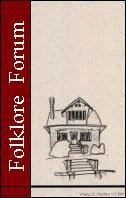Folklore Forum, a journal that is produced by graduate students at the Folklore and Ethnomusicology Department of Indiana University, has gone Open Access. From now on, 39 years of scholarship, debate, and exchange of ideas are freely accessible for everybody in the freshly digitized archives of Folklore Forum.
Their most recent volum focuses on Folklore and the Internet and includes articles on urban legends that circulate in chain letter-form as anonymous emails, and on icons and avatars as cyberart and examples of the development of folkloric art forms online.
Folklore has has always had an ambivalent relationship with mass media, Editor-in-Chief Curtis Ashton writes in the editorial:
Salvage ethnography to recover oral texts would be unnecessary if print were not invading 19th century Europe and America and depriving the Folk of their lore. (…) Though the trend has been shifting in professional meetings and journal publications, folklorists do tend to avoid the world of computers as a field for enquiry, either because of a lack of technical training or just a lack of general interest.
But as this volume demonstrates, the web has much to offer for folklorists:
I encourage our readers to consider how we use the Internet in our work as folklorists, as a object of study in an of itself, with its own discourse of traditional motifs; as a field for ethnographic research into the virtual, networked community; as a means for scholarly communication and publication; as a storage facility for the digitally compressed knowledge of the past; as a presentation space for the mutual benefit of both ethnographer and informant; as a means for reflection, rethinking how we do our work, what draws us to it, and why.
As a sidenote: In the most recent entry here on antropologi.info I wrote about how folkore can enrich anthropology, see “Take care of the different national traditions of anthropology”
SEE ALSO:
Now online: Up to 100 year old anthropology papers
2006 – The Year of Open Access Anthropology?
antropologi.info survey: Six anthropologists on Anthropology and Internet


I think it’s important to be careful of not reading in too much into what is going on in the virtual world. It’s not the real world, or even the ontological world. For ethnography in the virtual, a base in the real and ontological is necessary. Because, there is a person behind everything “on-line”. Somewhere, some time, there was a person who wrote or created a portion of what is on the internet. That’s where the ethnography should begin, how is the folklorist interacting with it’s computer, where is the folklorist when he/she is “on-line”, what does he/she do in front of the computer, etc. The virtual can be a lie, and we will never know what it’s true meaning is if we never look at the persons behind it.
“The virtual can be a lie”
But don’t you think the same can be said about the offline-world?
PS: I suppose you thought of something like this